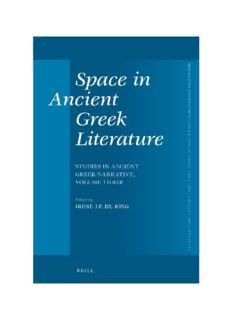
Space in Ancient Greek Literature: Studies in Ancient Greek Narrative PDF
Preview Space in Ancient Greek Literature: Studies in Ancient Greek Narrative
Space in Ancient Greek Literature Mnemosyne Supplements Monographs on Greek and Latin Language and Literature EditorialBoard G.J. Boter A. Chaniotis K.M. Coleman I.J.F. de Jong T. Reinhardt VOLUME339 Thetitlespublishedinthisseriesarelistedatbrill.nl/mns Space in Ancient Greek Literature Studies in Ancient Greek Narrative Editedby Irene J.F. de Jong LEIDEN•BOSTON 2012 LibraryofCongressCataloging-in-PublicationData SpaceinancientGreekliterature:studiesinancientGreeknarrative/editedbyIreneJ.F.de Jong. pages.cm.–(Mnemosynesupplements;volume339) Includesbibliographicalreferencesandindex. ISBN978-90-04-22257-1(hardback:alkalinepaper)1.Greekliterature–Historyand criticism.2.Spaceandtimeinliterature.I.Jong,IreneJ.F.de.II.Series:Mnemosyne, bibliothecaclassicaBatava.Supplementum;339. PA3015.S72S662012 880.9'384–dc23 2011047474 ISSN0169-8958 ISBN9789004222571(hardback) ISBN9789004224384(e-book) Copyright2012byKoninklijkeBrillNV,Leiden,TheNetherlands. KoninklijkeBrillNVincorporatestheimprintsBrill,GlobalOriental,HoteiPublishing, IDCPublishers,MartinusNijhoffPublishersandVSP. Allrightsreserved.Nopartofthispublicationmaybereproduced,translated,storedin aretrievalsystem,ortransmittedinanyformorbyanymeans,electronic,mechanical, photocopying,recordingorotherwise,withoutpriorwrittenpermissionfromthepublisher. AuthorizationtophotocopyitemsforinternalorpersonaluseisgrantedbyKoninklijkeBrillNV providedthattheappropriatefeesarepaiddirectlytoTheCopyrightClearanceCenter, 222RosewoodDrive,Suite910,Danvers,MA01923,USA. Feesaresubjecttochange. Thisbookisprintedonacid-freepaper. CONTENTS Preface ................................................................. ix Glossary................................................................ xi Introduction.NarratologicalTheoryonSpace ....................... 1 I.J.F.deJong PARTONE EPICANDELEGIACPOETRY . Homer ............................................................. 21 I.J.F.deJong . TheHomericHymns.............................................. 39 I.J.F.deJong . ApolloniusofRhodes ............................................. 55 J.J.H.Klooster . Callimachus ....................................................... 77 M.A.Harder . Theocritus ......................................................... 99 J.J.H.Klooster PARTTWO HISTORIOGRAPHY . Herodotus ......................................................... 121 T.Rood . Thucydides......................................................... 141 T.Rood . Xenophon.......................................................... 161 T.Rood . Polybius............................................................ 179 T.Rood vi contents . Josephus ........................................................... 199 L.HuitinkandJ.W.vanHenten . Appian ............................................................. 219 L.V.Pitcher . Pausanias .......................................................... 235 J.Akujärvi . CassiusDio ........................................................ 257 L.V.Pitcher . Herodian........................................................... 269 L.V.Pitcher PARTTHREE CHORALLYRIC . PindarandBacchylides ........................................... 285 B.G.F.Currie PARTFOUR DRAMA . Aeschylus .......................................................... 307 R.Rehm . Sophocles .......................................................... 325 R.Rehm . Euripides........................................................... 341 M.Lloyd . Aristophanes....................................................... 359 A.M.Bowie PARTFIVE ORATORY . Lysias............................................................... 377 M.P.deBakker contents vii . Demosthenes ...................................................... 393 M.P.deBakker PARTSIX PHILOSOPHY . Plato................................................................ 415 K.A.Morgan PARTSEVEN BIOGRAPHY . Plutarch............................................................ 441 M.Beck . Philostratus........................................................ 463 T.J.G.Whitmarsh PARTEIGHT THENOVEL . Chariton ........................................................... 483 K.deTemmerman . XenophonofEphesus ............................................. 503 K.deTemmerman . AchillesTatius ..................................................... 517 K.deTemmerman . Longus ............................................................. 537 J.R.Morgan . Heliodorus......................................................... 557 J.R.Morgan Bibliography ........................................................... 579 Index ................................................................... 607 PREFACE This is the third volume of Studies in Ancient Greek Narrative (SAGN), aserieswhich,aswassetoutintheGeneralIntroductiontovolume, aimsatinvestigating‘theformsandfunctionsofthemaindeviceswhich narratology has defined for us, such as the narrator and his narratees, time,focalization,characterization,description,speech,andplot’.Earlier volumesdealtwith‘narrators,narratees,andnarratives’and‘time’. Contributorsaregivenathreefoldbrief:toseewhichoftheaspectsof thedeviceunderconsideration(setoutintheIntroduction)arefoundin hisorherauthor;todescribehowthisauthorhandlesthoseaspects;and torelatehishandlingtothatofearlierandlaterauthors. Aftereditingthreevolumesithasbecomecleartomethatasregards thethirdaimoftheseries,tracingthehistoricaldevelopmentofadevice, I have perhaps been too optimistic. For most contributors narratology is something new and their energy is spent largely on mastering it for theirownauthor,leavingthemlittletimetoreflectonthediachronical perspective.Readersareatleastinformedabouttheexistence(anddis- cussion)ofasimilardeviceinanotherauthor(chapter)throughanarrow ( ),butIamfullyawarethatthisisonlyscratchingthesurfaceofamuch → largertopic,worthtobeexploredsomedayatamoreelaboratescale. IamhappythatliketheprevioustwotimesIhavebeenabletocover most of the narrative texts of ancient Greek literature, finding enough peoplewillingtojoinmeinthispioneeringprojectoflookingatancient textsfromanewperspective.Theteamwasbyandlargethesameasthat ofvolumesand,withsomewelcomereinforcements. Once again, this volume was prepared for in a workshop, held in Amsterdam on September –, . I wish to thank the Netherlands OrganizationforScientificResearch(NWO)andtheInstituteofCulture and History (ICG) of the University of Amsterdam for their financial support. Thepreparationofthemanuscriptforpublicationwasinthe—highly efficient and careful—hands of the copy-editor of Mnemosyne, Wim Remmelink. IdJ.
Description: